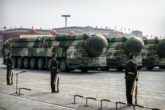May 02, 2017
US China Envoy Likely to See Responsibilities Grow Asia-Wide
They say “personnel is policy.” In foreign relations, U.S. President Donald Trump largely has neither. Key national security posts across the government remain empty, and many of the appointments he has made seem as likely to burn out as they do to eventually shape global affairs.
Mike Flynn became the shortest-serving national security advisor in history, and White House advisor Steve Bannon, while still exerting nationalist influences, has reportedly faded. Hapless Secretary of State Rex Tillerson, a much-vaunted international dealmaker from the private sector, has suffered significant missteps abroad and is hemorrhaging credibility.
As a result, this week the Senate is considering an unlikely heir for Trump’s entire foreign policy in Asia: the mild-mannered and mustachioed Iowa Governor Terry Branstad.
Read the full article at The Diplomat.
More from CNAS
-
In Brief: Increasing Tensions Between China and Japan Create Risks for the Region
This article was originally published in War on the Rocks. China’s latest pressure campaign targeting Japan serves multiple purposes for Beijing. One is to redirect domestic p...
By Jacob Stokes
-
China May Grab a Lead in the Race for Military Fusion
This article was originally published in The Wall Street Journal. America’s top diplomat for nuclear-weapons issues, Undersecretary of State Thomas DiNanno, revealed this mont...
By David Feith
-
Afghanistan Under Taliban Rule Makes the World Less Safe
This article was originally published in The Diplomat. The Taliban regime is expanding its provision of national sanctuary to terrorist groups with regional and international ...
By Annie Pforzheimer
-
Hearing on “India, China, and the Balance of Power in the Indo-Pacific”
Commissioners, thank you for the opportunity to testify at today’s hearing. There are few relationships that have the potential to be as consequential to the balance of power ...
By Lindsey Ford




